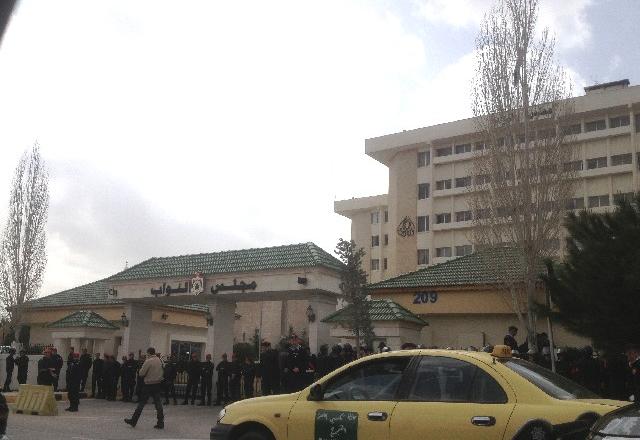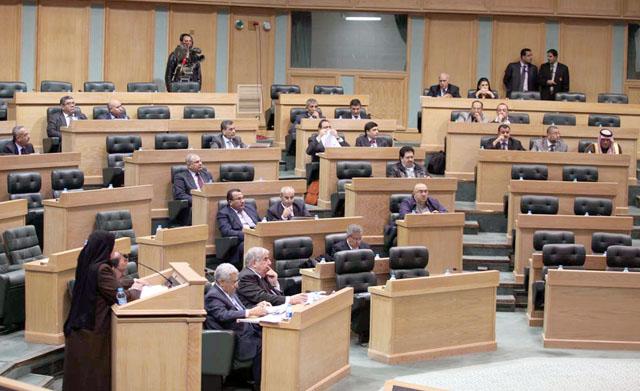You are here
Government survives no-confidence vote
By JT - Mar 18,2014 - Last updated at Mar 18,2014

AMMAN – The government on Tuesday survived a no-confidence motion over what some deputies described as its failure to properly respond to the killing of Judge Raed Zuaiter, who was shot dead by Israeli soldiers last week.
After a week of lobbying, a majority of the MPs present on Tuesday afternoon voted in favour of Prime Minister Abdullah Ensour’s government following a heated session, particularly after Lower House Speaker Atef Tarawneh earlier decided not to hold a vote of no-confidence.
The speaker then agreed to the demands of deputies and went ahead with the vote.
A total of 81 deputies voted “yea” for granting confidence to the government, while 29 withheld confidence and 20 MPs abstained. A total of 130 deputies out of the 150-strong House attended the session.
The no-confidence motion was presented due to what some deputies described as the government’s inadequate response to the shooting of 38-year-old Zuaiter on the King Hussein Bridge crossing that links Jordan with the West Bank.
Following the incident, several MPs called for expelling the Israeli ambassador and abolishing the peace treaty with Israel, signed in 1994.
Israeli President Shimon Peres and Prime Minister Benjamin Netanyahu expressed their “deep regret” over the death of Zuaiter, who was going to visit Nablus, in separate telephone calls with His Majesty King Abdullah on Monday.
In response to Tuesday’s confidence vote, MP Yihya Saud (Amman, 2nd District) announced his resignation “from this weak House”.
After the Lower House granted its confidence to the government, minor clashes broke out between security personnel and protesters outside Parliament.
Some were wounded and others arrested, but no exact figures were available.
The demonstrators raised their shoes to express their rejection of the Lower House’s decision, chanting slogans against the government and Ensour.
Addressing MPs prior to the vote, the premier said the government has started a joint investigation with Israeli authorities into the incident, noting that this was one of the demands and “it has been achieved”.
In light of the ongoing joint investigation, the premier said the government believes that a decision to expel the Israeli ambassador and recall Jordan’s ambassador from Tel Aviv would jeopardise the entire case, as it would give the Israelis the pretext to cancel the joint investigation and “then we will not be able to get to the bottom of the incident”.
An escalatory move like that would encourage Israelis to expedite unilateral actions in Jerusalem targeting all Islamic and Christian shrines there, and block “our ambassador’s efforts to help the Jordanian prisoners in Israeli jails”, he noted.
The joint investigation is being held amid ongoing efforts to draft a framework for a peaceful solution to the Middle East conflict, Ensour added, citing US Secretary of State John Kerry’s peace plan.
“This will negatively affect our chances to follow up on the negotiations and reduce our ability to safeguard our higher national interests,” he said.
The premier pointed out that the peace treaty with Israel draws final and fixed borders between Jordan and Israel, a matter of great importance to the Kingdom.
By cancelling the treaty “we recreate the danger of the alternative homeland option”, he warned.
At the start of the session, Tarawneh told MPs that he sent letters to several international parliamentary unions calling on them to condemn the “crime” against Zuaiter.
Ensour won a previous vote of confidence in his government last year, when he first formed his Cabinet on April 2013. At the time, 83 MPs voted “yea”, while 65 voted “nay”.
Related Articles
The Lower House on Wednesday postponed a discussion over a vote of no-confidence petition to next week, giving the government almost a week to act and meet the MPs demands over measures against Israel after occupation soldiers shot and killed a Jordanian judge.
His Majesty King Abdullah on Monday received phone calls from Israeli President Shimon Peres and Prime Minister Benjamin Netanyahu, during which they expressed “deep regret” over the killing of Jordanian Judge Raed Zuaiter last week, a Royal Court statement said.
The Lower House is scheduled to meet on Tuesday to discuss two motions of no-confidence in the government.




















